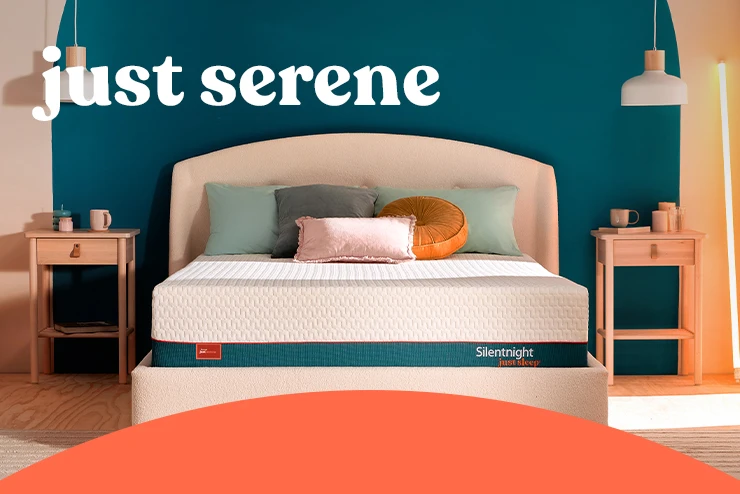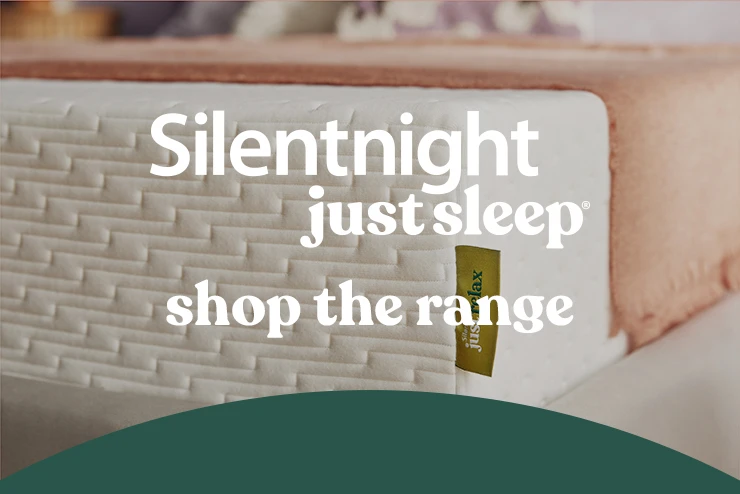hay fever at night: does hay fever make you tired?

The best way to manage hay fever symptoms at night is to take antihistamines (especially if they’re drowsy), have a shower or bath to wash away any pollen build-up, keep the windows closed, use an air purifier and opt for anti-allergy bedding, all before bedtime.
Hay fever often feels worse at night due to the pollen shower effect, when cooler evening air causes pollen to settle.
Anti-allergy bedding helps reduce pollen build-up, dust mites and bacteria, supporting clearer breathing and more restful sleep during the summer.
As the evenings grow lighter and flowers start to bloom, many of us look forward to slower, warmer days. But for anyone living with hay fever, this season can be anything but relaxing, especially at night. If you’re sneezing after sunset or struggling with a hay fever cough at night, you’re not imagining it.
In honour of Allergy Awareness Week, we’re taking a closer look at what causes hay fever at night, why symptoms can feel worse after dark and how to ease them for a more restful, restorative sleep.
sleeping with hay fever
Your bedroom should feel like a sanctuary: quiet, calm and cool. But when hay fever strikes at night, it can turn even the cosiest sleep space into a source of irritation.
Hay fever often causes congestion, making it harder to breathe comfortably when you lie down. You might find yourself snoring, coughing or tossing and turning in search of relief. And if you already live with asthma or another respiratory condition, allergy flare-ups can make those symptoms worse.
Over time, this broken sleep can build into fatigue. You wake feeling groggy and drained, and it’s harder to focus, stay calm or feel energised through the day. Good sleep supports everything from your mood to your immune system, so when hay fever gets in the way it’s worth paying attention. This Allergy Awareness Week, we’re helping shine a light on what allergies really mean for your sleep and wellbeing. Here are three important reminders:
Allergies can start at any age, even if you’ve never had symptoms before.
They can worsen other conditions like asthma, especially at night.
Getting a proper diagnosis helps you access the care and support you need.
why is my hay fever worse at night?
It’s a common question, and the answer lies in both the natural world and your home environment. As the air cools in the evening, pollen that’s been lifted throughout the day by warm air begins to fall, what’s known as the pollen shower phenomenon. That’s why you might wake up with blocked sinuses or an itchy throat. Night-time also brings you into close contact with other allergens, like dust mites and pet dander, which often settle in bedding and carpets. And lying flat can make nasal congestion worse, as mucus collects more easily in the sinuses. You might even wonder, can you get hay fever at night without symptoms during the day? The answer is yes. For some people, it’s the unique mix of pollen, bedding and bedtime habits that trigger symptoms only after sundown.
hay fever at night vs. daytime symptoms
While most hay fever symptoms don’t differ whether it’s the nighttime or daytime, the intensity of the symptoms can.
Daytime symptoms: Symptoms are triggered by pollen so you’re more likely to feel hay fever's affects when outdoors.
Nighttime symptoms: Symptoms can worsen due to other allergens like pet hair and dust mites, and from pollen settling in your home as it gets cooler.
how to help hay fever at night
Sleeping with hay fever can feel like a challenge, but it doesn’t have to ruin your nights. Here’s some hay fever nighttime remedies that’ll reduce symptoms and help you ease into sleep more smoothly.
Take hay fever tablets
It’s perfectly safe to take an antihistamine before bed, and for many people, it’s a smart move. Some tablets are mildly sedating, but taking them at night means they’re less likely to make you drowsy during the day. You might also want to use eye drops or anti-itch creams before bedtime to calm irritated skin. A small dab of petroleum jelly just inside your nostrils can help trap pollen and stop it from being breathed in while you sleep.
wash the day away
A warm shower before bed does more than relax you – it helps remove pollen from your hair, face and skin. Pay attention to your eyelashes, nose and even eyebrows, where microscopic particles can settle unnoticed.
Wash your bedding regularly too, ideally at 60°C to wipe out pollen and dust mites. And try not to dry your laundry outside during high pollen periods. Between laundry loads, if you can, place a light sheet or throw over your bed during the day to stop allergens from settling on your pillows and duvet. Then whip it off before bedtime for a pollen-free sanctuary.
keep pollen out of your room
On warmer nights, it’s tempting to throw open the windows, but this can let in pollen along with the fresh air. If you need to ventilate your space, check the pollen forecast first and aim for rainy or still days, when the pollen count is naturally lower.
An air purifier can also be a game-changer for night-time allergies, quietly removing airborne particles so you can breathe easier while you sleep.
choose anti-allergy bedding
Soft, breathable and allergen-resistant, our anti-allergy bedding is designed to support clearer breathing and deeper rest. Unlike standard hypoallergenic bedding, our range is scientifically tested and approved by the British Allergy Foundation: proven to actively reduce allergens such as pollen, dust mites and bacteria.
Whether it’s your duvet, pillows or mattress protector, creating a cleaner sleep surface can make all the difference when hay fever symptoms flare up.
natural remedies for nighttime hay fever
There are several more natural ways you can soothe your hay fever symptoms at night, making them more accessible.
Eating/adding honey to your beverages
Eating quercetin-rich foods (i.e. onions, apples, kale and broccoli)
Drinking camomile or nettle teas
Using an air purifier in your bedroom
managing hay fever at night for children
It’s one thing to help your own hay fever symptoms, but having to do your best at soothing your children’s can be even more challenging. Here’s what we recommend:
Keep pets out of their bedroom
Keep their windows closed
Use an air purifier in their room
Opt for hypoallergenic bedding
Give them a bath or shower prior to bedtime
Put them in clean clothes before bedtime
Give them antihistamines in the evening
We then recommend you keep monitoring their symptoms and adjust their routine as you see fit.
FAQs
Our experts have answered some of the most-asked questions surrounding hay fever at night.
does dust worsen nighttime hay fever?
Yes, dust in the air is likely to trigger or worsen hay fever symptoms. Similarly, dust mites also carry allergens and tend to live in beds. They are more active at night, meaning you’re more likely to be exposed to them. A great way to minimise dust mite infestations is by cleaning your mattress.
what’s the impact of humidity on nighttime hay fever?
High humidity levels can increase allergens in the air, therefore triggering your hay fever symptoms. An air purifier is a great way to reduce the impact of humidity. You don’t have to let hay fever rule your nights. By understanding why symptoms feel worse after dark and making a few gentle changes to your routine, you can soothe irritation and drift off more easily. If you're still massively struggling, we recommend finding a doctor for severe nighttime hay fever.





























